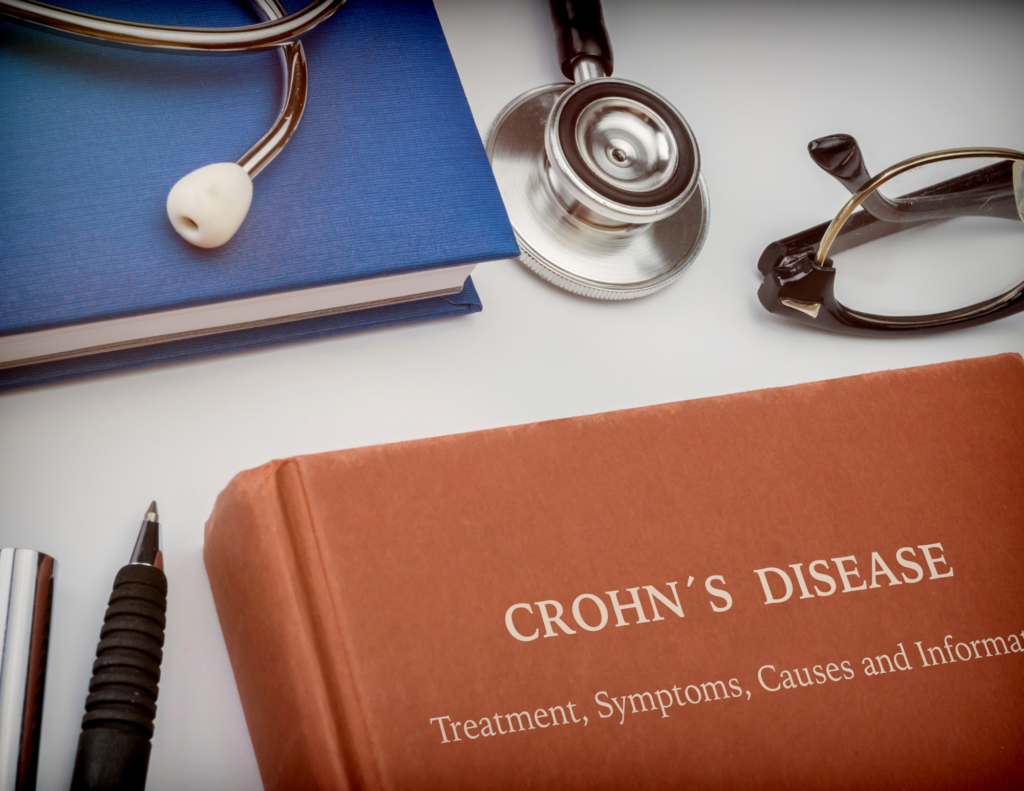
Living with Crohn’s disease can feel like a rollercoaster—one that often takes unexpected twists and turns. Whether it’s the frustration of flare-ups, the exhaustion of managing symptoms, or the uncertainty of what’s next, the journey is anything but easy. But here’s the good news: you don’t have to face it alone.
Crohn’s disease is a complex condition that affects millions of people worldwide, yet it’s often misunderstood. If you’ve ever wondered, What is Crohn’s disease? Why am I experiencing these symptoms? What can I do to feel better?—you’re in the right place. This guide is designed to answer those questions and more, giving you the tools to understand and manage Crohn’s with confidence.
From recognizing early signs to exploring treatment options and lifestyle adjustments, we’ll cover everything you need to know. Whether you’re newly diagnosed, supporting a loved one, or just seeking clarity, this post is here to provide support, education, and encouragement for the road ahead. Let’s dive in and demystify Crohn’s disease together.
What is Crohn’s Disease?
Crohn’s disease is more than just an upset stomach—it’s a chronic inflammatory bowel disease (IBD) that affects the digestive tract. Unlike occasional digestive discomfort, Crohn’s is a lifelong condition that can cause significant challenges, impacting everything from daily routines to long-term health. It can affect any part of the digestive system, from the mouth to the anus, but it most commonly involves the small intestine and colon.
This condition is marked by periods of flare-ups—when symptoms become more intense—and remission, where symptoms might ease or disappear for a time. While Crohn’s can be unpredictable, understanding it is the first step toward managing it and regaining control over your health.
Crohn’s disease happens when your immune system mistakenly attacks healthy tissues in your digestive tract, leading to inflammation, ulcers, and other issues. While researchers don’t fully understand why this happens, we know that factors like genetics, environment, and the immune system all play a role.
Living with Crohn’s can be tough, but it doesn’t mean life stops. With the right treatment plan, support, and mindset, many people with Crohn’s lead full, active lives. Whether you’re newly diagnosed or just seeking clarity, understanding the basics of this condition is key to navigating it with confidence.

Symptoms of Crohn’s Disease
Crohn’s disease can feel like an invisible rollercoaster, with symptoms that range from mild to severe and often vary from person to person. At its core, it’s a condition that causes chronic inflammation in the digestive tract, but the way it shows up can sometimes be surprising.
The most common symptoms of Crohn’s include persistent diarrhea, abdominal pain, cramping, and fatigue. Many people also experience unintended weight loss, often because their bodies struggle to absorb nutrients properly. When flare-ups hit, these symptoms can feel overwhelming, making it hard to focus on anything else.
But Crohn’s doesn’t stop at the digestive system. Some individuals experience symptoms outside the gut, like mouth sores, skin rashes, or even joint pain. These signs, called “extraintestinal symptoms,” remind us that Crohn’s is more than just a stomach issue—it’s a whole-body condition.
During a flare-up, you might also notice blood in your stool, a fever, or an urgent need to use the restroom. These symptoms can be unsettling, but they’re important signals that your body needs care and attention. Recognizing them early can help you take action and get the support you need to manage the disease effectively.
Living with Crohn’s means staying in tune with your body and knowing the signs that something might be off. Whether your symptoms are mild or severe, they’re valid—and they deserve to be taken seriously. Always reach out to your healthcare provider if you notice changes or if your symptoms feel unmanageable.
Causes and Risk Factors
The exact cause of Crohn’s disease might still be a mystery, but researchers have uncovered some key factors that contribute to its development. Crohn’s doesn’t happen randomly—it’s influenced by a mix of genetics, the immune system, and environmental triggers. Understanding these causes can help you feel more informed and empowered when managing this condition.
1. Genetics
If Crohn’s runs in your family, you might be at a higher risk. Research shows that people with close relatives who have Crohn’s or other inflammatory bowel diseases (IBD) are more likely to develop the condition. While you can’t change your genes, knowing your family history can help you stay ahead of potential symptoms.
2. Immune System Dysfunction
Crohn’s is an autoimmune condition, meaning the immune system mistakenly attacks healthy tissues in your digestive tract. Instead of fighting off harmful invaders, the immune system goes into overdrive, causing chronic inflammation. This misfire is a central factor in the development of Crohn’s.
3. Environmental Factors
Where you live, and your lifestyle can also play a role. Crohn’s is more common in developed countries, urban areas, and northern climates, possibly due to factors like diet, pollution, or even antibiotic use. Smoking is another major risk factor, as it’s linked to more severe Crohn’s symptoms and complications.
4. Who’s at Risk?
Crohn’s can affect anyone, but certain groups are more likely to develop it. It often starts between the ages of 15 and 35, although it can appear at any age. Ethnicity also plays a role, with higher rates seen in people of Ashkenazi Jewish descent. However, Crohn’s doesn’t discriminate—it can impact individuals from all walks of life.
While these factors can increase your risk, having one or more doesn’t guarantee you’ll develop Crohn’s disease. Similarly, many people with Crohn’s don’t fit the typical risk profile. The important thing is to stay informed, recognize the signs early, and work with your healthcare provider to create a plan that supports your health.
How is Crohn’s Disease Diagnosed?
Getting a Crohn’s disease diagnosis can be a journey, especially since its symptoms often overlap with other conditions. But understanding the diagnostic process can help you feel more prepared and empowered to advocate for your health.
The first step usually begins with a detailed medical history and physical exam. Your doctor will ask about your symptoms, including how long they’ve been happening, their severity, and any family history of Crohn’s or other autoimmune conditions. This is your chance to share everything—no detail is too small when it comes to piecing together the puzzle.
From there, your doctor may recommend a series of tests and procedures to get a clearer picture of what’s going on:
- Blood Tests: These can identify inflammation or check for anemia, which is common in people with Crohn’s. Certain markers in your blood may also point to an autoimmune condition.
- Stool Tests: These tests help rule out infections or other conditions that could cause similar symptoms, like persistent diarrhea or abdominal pain.
- Colonoscopy: This procedure involves a thin, flexible tube with a camera that allows doctors to examine your colon and the end of your small intestine. During a colonoscopy, your doctor may take tissue samples (biopsies) to confirm inflammation and rule out other conditions, like cancer or infections.
- Imaging Studies: Tests like CT scans, MRI enterography, or small bowel X-rays can provide detailed images of your digestive tract, showing areas of inflammation, strictures, or fistulas.
Diagnosing Crohn’s can be tricky because its symptoms mimic those of other conditions, like irritable bowel syndrome (IBS) or ulcerative colitis. This process of ruling out other diseases is called a differential diagnosis. While it can take time, it’s an essential step to ensure you get the right diagnosis and treatment plan.
If you’re going through this process, know that it’s okay to feel overwhelmed—waiting for answers can be stressful. Don’t hesitate to ask questions, seek second opinions, or bring a trusted friend or family member to your appointments for support. A diagnosis is the first step to managing Crohn’s disease and reclaiming control over your health.

Complications of Crohn’s Disease
Crohn’s disease doesn’t just stop at causing digestive discomfort—it can lead to complications that affect your overall health and quality of life. These complications often arise when the condition is left untreated or poorly managed, making early intervention and ongoing care essential. Understanding these risks can help you stay informed and proactive in managing your health.
1. Intestinal Blockage
Chronic inflammation from Crohn’s can cause scar tissue to form in the intestines, leading to narrowing or strictures. This can partially or completely block the digestive tract, causing severe pain, nausea, and vomiting. In some cases, surgery is needed to remove the obstruction or repair the affected area.
2. Fistulas and Abscesses
When inflammation extends deep into the intestinal wall, it can create abnormal tunnels called fistulas. These fistulas can connect different parts of the intestine or even extend to other organs, like the bladder or skin. Abscesses, or pockets of infection, may also develop and require antibiotics or surgical drainage to prevent further complications.
3. Malnutrition
Crohn’s disease can interfere with your body’s ability to absorb nutrients, leading to deficiencies in vitamins and minerals like iron, calcium, and vitamin D. Symptoms like weight loss, fatigue, and anemia often result from this malabsorption, highlighting the need for a well-rounded treatment plan that includes dietary support.
4. Increased Risk of Colorectal Cancer
People with Crohn’s disease, particularly those with long-term inflammation in the colon, have a higher risk of developing colorectal cancer. Regular screenings, such as colonoscopies, are crucial for early detection and prevention.
5. Perforation and Ulcers
Severe inflammation can lead to the development of ulcers in the digestive tract, which can worsen over time and, in rare cases, cause perforation (a hole in the intestinal wall). This is a medical emergency requiring immediate attention.
6. Emotional and Mental Health Challenges
Living with Crohn’s disease can take a toll on your mental health. The unpredictability of symptoms, coupled with the physical pain and dietary restrictions, often leads to anxiety, depression, and feelings of isolation. Seeking support from therapists, support groups, or loved ones can make a big difference.
7. Other Health Issues
Crohn’s can also lead to complications beyond the digestive system, such as joint pain, eye inflammation, and skin conditions. These extraintestinal symptoms remind us that Crohn’s is a whole-body condition requiring comprehensive care.
Staying Ahead of Complications
While these complications might sound intimidating, the key to preventing them lies in managing Crohn’s disease effectively. Staying consistent with treatment, recognizing warning signs early, and working closely with your healthcare team can help you minimize risks and maintain a higher quality of life. With the right care and support, it’s possible to keep these complications at bay and live a fulfilling, balanced life.
Treatment Options for Crohn’s Disease
There isn’t a one-size-fits-all approach to treating Crohn’s disease, but the good news is that there are many options to help manage symptoms, reduce inflammation, and improve quality of life. The goal of treatment is to control flare-ups, maintain remission, and prevent complications, and that often requires a combination of approaches tailored to your unique needs.
1. Medications
Medications are often the first line of defense for managing Crohn’s disease. Your doctor might recommend:
- Anti-inflammatory Drugs: Medications like corticosteroids and aminosalicylates (5-ASAs) help reduce inflammation during flare-ups.
- Immunosuppressants: These drugs, including azathioprine and methotrexate, calm the immune system to prevent it from attacking the digestive tract.
- Biologics: Targeted therapies like infliximab (Remicade) or adalimumab (Humira) are designed to block specific proteins causing inflammation.
- Antibiotics: Often used to treat or prevent infections associated with fistulas or abscesses.
Medication plans can vary widely, and it might take time to find the right combination. Open communication with your healthcare provider is key to managing side effects and ensuring the treatment works effectively.
2. Dietary Management
While there isn’t a “Crohn’s diet,” certain foods can worsen symptoms during flare-ups. Your doctor or a dietitian can help you identify triggers and create a Crohn’s-friendly meal plan.
- During flare-ups: Stick to low-fiber, easily digestible foods to reduce strain on your digestive system.
- In remission: Focus on a balanced diet rich in nutrients to combat malnutrition and support overall health.
Some people find success with elimination diets or keeping a food journal to track how their body reacts to certain foods.
3. Surgery
When medications and lifestyle changes aren’t enough, surgery may be necessary. About 50% of people with Crohn’s disease will require surgery at some point, often to remove damaged portions of the digestive tract or to address complications like strictures or fistulas.
- Common procedures include bowel resection (removing diseased sections) or creating a stoma for waste elimination.
- Surgery isn’t a cure, but it can significantly improve the quality of life and relieve symptoms when other treatments have failed.
4. Lifestyle Adjustments
Managing Crohn’s isn’t just about medication—it’s about making lifestyle changes to reduce triggers and maintain balance.
- Stress Management: Stress can worsen symptoms, so techniques like yoga, meditation, or therapy can be incredibly beneficial.
- Regular Exercise: Staying active helps reduce inflammation, boost energy, and improve overall well-being.
- Smoking Cessation: Smoking is a known risk factor for Crohn’s complications. Quitting can make a big difference in symptom management.
5. Emerging Therapies
The future of Crohn’s treatment is promising, with advancements like stem cell therapy and personalized medicine showing potential. Clinical trials often offer access to cutting-edge treatments for those who qualify.
Finding What Works for You
Crohn’s disease is unique to each person, which means your treatment journey will be too. It might take time to find the right combination of therapies, but the goal is always the same: to help you live a full and active life. Remember, you’re not alone in this journey. Work closely with your healthcare provider, lean on your support system, and explore all the tools available to help you thrive.
Living with Crohn’s Disease
Living with Crohn’s disease means navigating a world of unpredictability, but it doesn’t have to define your life. While flare-ups and symptoms can feel overwhelming at times, many people with Crohn’s lead full, active, and meaningful lives by making thoughtful adjustments and building a strong support system.
1. Listen to Your Body
One of the most important things you can do is stay in tune with your body. Pay attention to how you feel, and take note of any patterns. Tracking symptoms, diet, and even stress levels can help you identify triggers and make informed choices to minimize flare-ups. Using a symptom journal or a mobile app can make this process easier.
2. Build a Support System
Crohn’s can sometimes feel isolating, but you don’t have to face it alone. Whether it’s leaning on family and friends, joining an online support group, or connecting with others through organizations like the Crohn’s & Colitis Foundation, having people who “get it” can make all the difference. Sharing experiences, tips, and encouragement creates a sense of community that helps lighten the emotional load.
3. Make Crohn’s-Friendly Adjustments
Everyday habits can go a long way in managing your condition:
- Diet: Work with a dietitian to find a meal plan that works for you. Avoid known triggers, eat smaller meals throughout the day, and stay hydrated.
- Stress Management: Stress doesn’t cause Crohn’s, but it can certainly make symptoms worse. Practices like yoga, meditation, or simply carving out time for activities you enjoy can help keep stress levels in check.
- Exercise: Gentle activities like walking, swimming, or yoga can help reduce inflammation, improve mood, and support overall health. Listen to your body and avoid overexertion during flare-ups.
4. Advocate for Your Health
Be your own best advocate by staying informed about Crohn’s and communicating openly with your healthcare team. Keep a list of questions for your doctor, explore new treatments, and don’t hesitate to seek second opinions if something doesn’t feel right. You’re an active participant in your care, and your voice matters.
5. Prioritize Mental and Emotional Well-Being
The physical challenges of Crohn’s are often paired with emotional ones. It’s normal to feel frustrated, anxious, or even depressed at times. Seeking professional help from a therapist who understands chronic illness can provide tools to manage these feelings. Remember, asking for help isn’t a sign of weakness—it’s a step toward building resilience.
Embracing Your Journey
Living with Crohn’s disease is about more than managing symptoms—it’s about finding ways to thrive despite the challenges. Celebrate the small wins, lean on your support system, and take care of yourself in every way you can. Crohn’s might be part of your story, but it doesn’t have to be the whole book. With the right tools, mindset, and care, you can live a fulfilling and balanced life.
Crohn’s and Diet
When it comes to managing Crohn’s disease, diet plays a critical role. While there’s no one-size-fits-all meal plan, understanding how food affects your body can help you navigate flare-ups, maintain remission, and support overall health. The right diet won’t cure Crohn’s, but it can make life with the condition a lot easier.
1. Understanding Dietary Triggers
Food doesn’t cause Crohn’s disease, but certain foods can aggravate symptoms during a flare-up. Common triggers include high-fiber foods like raw vegetables and whole grains, as well as spicy dishes, caffeine, and dairy. Keeping a food journal can help you identify which foods your body tolerates and which ones to avoid.
2. Eating During Flare-Ups
When your digestive system is inflamed, it’s time to go easy on your gut. During flare-ups, focus on low-fiber, easily digestible foods to minimize discomfort. Options like plain rice, applesauce, boiled chicken, and clear broths are often easier to handle. Small, frequent meals can also reduce the strain on your digestive system.
3. Supporting Remission with Nutrition
When symptoms are under control, it’s important to nourish your body and prevent malnutrition. Incorporate nutrient-rich foods like lean proteins, healthy fats, and cooked vegetables. Foods rich in vitamins and minerals, such as salmon (high in omega-3s) or spinach (packed with iron), can help address common deficiencies in people with Crohn’s.
4. The Role of Hydration
Staying hydrated is essential, especially if you experience diarrhea, which can lead to dehydration. Stick to water or electrolyte-rich beverages, and limit sugary drinks or alcohol, which can irritate the gut.
5. Exploring Elimination Diets
Some people find relief through elimination diets, where you temporarily remove potential triggers (like gluten, dairy, or certain additives) and slowly reintroduce them to identify sensitivities. Working with a dietitian can make this process more effective and less overwhelming.
6. Probiotics and Supplements
For some individuals, probiotics can help maintain gut health by supporting a healthy balance of bacteria in the digestive system. Additionally, supplements like vitamin D, iron, or calcium might be recommended if Crohn’s has impacted your ability to absorb nutrients. Always consult your doctor before adding supplements to your routine.
Working with a Professional
Navigating diet with Crohn’s disease can feel complicated, but you don’t have to do it alone. A registered dietitian or nutritionist who specializes in inflammatory bowel disease can help you create a personalized meal plan that supports your health and minimizes symptoms. The key is finding what works best for your body and making gradual changes that feel sustainable.
Eating with Crohn’s disease is a journey of trial and error, but with patience and the right support, you can find a diet that helps you feel your best—whether you’re managing a flare-up or enjoying remission.

Research and Future Directions
Crohn’s disease may not have a cure yet, but advancements in research are bringing hope to millions living with the condition. From new treatments to groundbreaking discoveries, the future is looking brighter for those with Crohn’s. Staying informed about these developments can empower you to explore new options and feel optimistic about the journey ahead.
1. Advancements in Medications
Medications for Crohn’s disease are evolving rapidly, with new therapies offering better control over inflammation and fewer side effects. Biologics, like anti-TNF drugs, have revolutionized treatment in recent years, and newer biologics are being developed to target specific proteins involved in the inflammatory process. Meanwhile, oral therapies, such as Janus kinase (JAK) inhibitors, are showing promise for those who haven’t responded to other treatments.
2. Personalized Medicine
One of the most exciting areas of research is personalized medicine, where treatments are tailored to your unique genetic makeup, symptoms, and disease progression. This approach aims to make treatments more effective by addressing the specific factors driving your condition, reducing the trial-and-error process that many patients face.
3. The Gut Microbiome Connection
Scientists are uncovering how the gut microbiome— the trillions of bacteria living in your digestive system—plays a crucial role in Crohn’s disease. Research into probiotics, prebiotics, and fecal microbiota transplants (FMT) is underway, aiming to restore a healthy microbial balance and reduce inflammation. While these treatments are still in experimental stages, they hold tremendous potential.
4. Stem Cell Therapy
Stem cell therapy is an emerging area of Crohn’s research, focusing on using stem cells to repair damaged tissues and regulate the immune system. Clinical trials have shown encouraging results, particularly for people with severe or refractory Crohn’s disease. Although still experimental, stem cell therapy may one day provide a transformative option for those with the condition.
5. Ongoing Clinical Trials
Clinical trials are critical in testing new treatments and improving existing ones. Participating in a trial not only gives you access to cutting-edge therapies but also contributes to advancing medical understanding of Crohn’s disease. If you’re interested in clinical trials, resources like ClinicalTrials.gov can help you explore options tailored to your needs.
6. Advocating for Awareness and Research Funding
Progress in Crohn’s research is fueled by advocacy and funding. Organizations like the Crohn’s & Colitis Foundation work tirelessly to raise awareness and support innovative research. By participating in awareness campaigns or fundraising events, you can play a role in advancing the science and finding better treatments for Crohn’s disease.
Looking Ahead
The future of Crohn’s disease treatment is filled with possibilities. From cutting-edge therapies to deeper insights into the gut-brain connection, researchers are closer than ever to unlocking the mysteries of this condition. While living with Crohn’s has its challenges, advancements in science and medicine offer hope for a better tomorrow. Staying informed and advocating for continued research can make a world of difference—not just for you, but for the millions affected by Crohn’s disease worldwide.
Resources for Support
Living with Crohn’s disease can be overwhelming, but you don’t have to face it alone. Whether you’re navigating a new diagnosis or managing long-term symptoms, there are many resources available to help you feel supported, informed, and empowered. From online communities to trusted organizations, here are some go-to resources to guide you every step of the way.
1. Trusted Organizations
- Crohn’s & Colitis Foundation: This organization offers a wealth of information on Crohn’s disease, including educational resources, local support groups, and updates on research and treatments. Their website also features an “IBD Help Center” for personalized guidance.
Website: crohnscolitisfoundation.org - National Institute of Diabetes and Digestive and Kidney Diseases (NIDDK): A government resource providing detailed information about Crohn’s, including causes, symptoms, and treatment options.
Website: niddk.nih.gov - American Gastroenterological Association (AGA): Offers resources for patients, including articles, videos, and tools to better understand Crohn’s disease.
Website: gastro.org
2. Online Communities and Support Groups
- Inspire: A free online community where people with Crohn’s can connect, share experiences, and find encouragement.
Website: inspire.com - MyCrohnsAndColitisTeam: A social network specifically for people with Crohn’s and colitis, allowing members to share advice, find local meet-ups, and build a support system.
Website: mycrohnsandcolitisteam.com - Reddit’s r/CrohnsDisease: An active online forum where members discuss tips, ask questions and offer support.
Website: reddit.com/r/CrohnsDisease
3. Mobile Apps and Tools
Technology can be a great ally in managing Crohn’s disease. These apps help track symptoms, medications, and triggers:
- GI Buddy: Created by the Crohn’s & Colitis Foundation, this app helps track daily symptoms, diet, and medications to better manage IBD.
- Flaredown: Designed for chronic illness management, this app helps you identify patterns and triggers over time.
4. Books and Reading Materials
For those who prefer in-depth learning, these books offer valuable insights:
- “Crohn’s and Colitis For Dummies” by Tauseef Ali, MD: A beginner-friendly guide packed with practical advice for managing IBD.
- “The First Year: Crohn’s Disease and Ulcerative Colitis” by Jill Sklar: A step-by-step guide to navigating the first year after diagnosis.
- “Breaking the Vicious Cycle” by Elaine Gottschall: A popular resource on the Specific Carbohydrate Diet (SCD) for managing IBD symptoms.
5. Advocacy and Awareness
- IBD Awareness Month: Held every May, this campaign raises awareness about Crohn’s and colitis. Participating in events or fundraisers can help bring attention to the condition and support ongoing research.
- Local Support Groups: Many communities have in-person support groups organized through hospitals or organizations like the Crohn’s & Colitis Foundation. Check their website to find groups near you.
You’re Not Alone
Living with Crohn’s disease is a journey, but you don’t have to navigate it by yourself. These resources can provide the tools, connections, and encouragement you need to face each day with strength and confidence. Whether it’s finding answers to your questions, joining a support group, or learning about the latest treatments, help is always within reach.
Living with Crohn’s disease is a journey filled with challenges, but it’s also one of resilience and strength. Understanding the condition, recognizing symptoms early, and embracing treatments tailored to your needs can make all the difference. By staying informed, building a strong support system, and prioritizing your health, you can navigate life with Crohn’s and still enjoy a fulfilling, balanced life.
Whether you’re newly diagnosed, supporting a loved one, or simply looking for ways to manage this condition more effectively, knowledge is your most powerful tool. Remember, you’re not alone—millions of people are walking this path alongside you, and resources, professionals, and communities are here to help.
If you found this guide helpful, don’t miss out on more insights and tips for living well with Crohn’s disease. Sign up for our newsletter to stay updated on the latest research, expert advice, and practical strategies for managing your health. Together, we can take the first steps toward a healthier, more empowered future.

Leave a Reply
You must be logged in to post a comment.